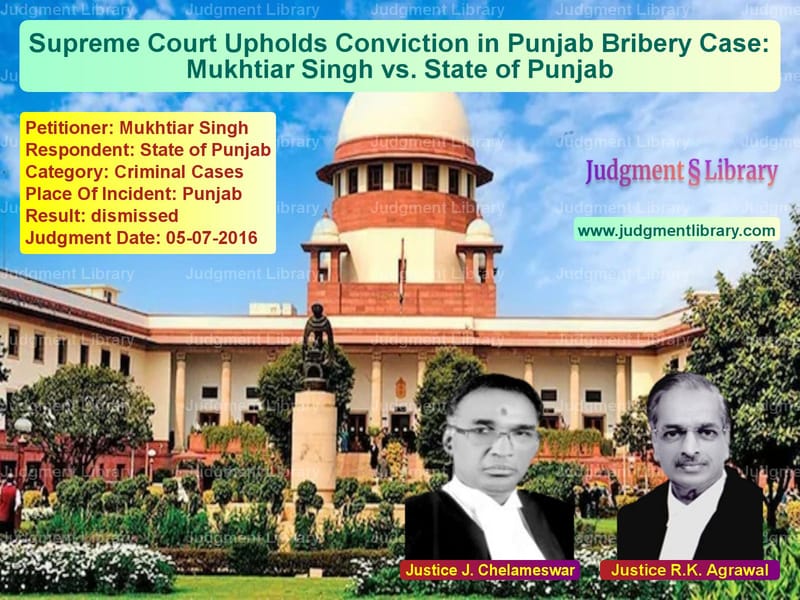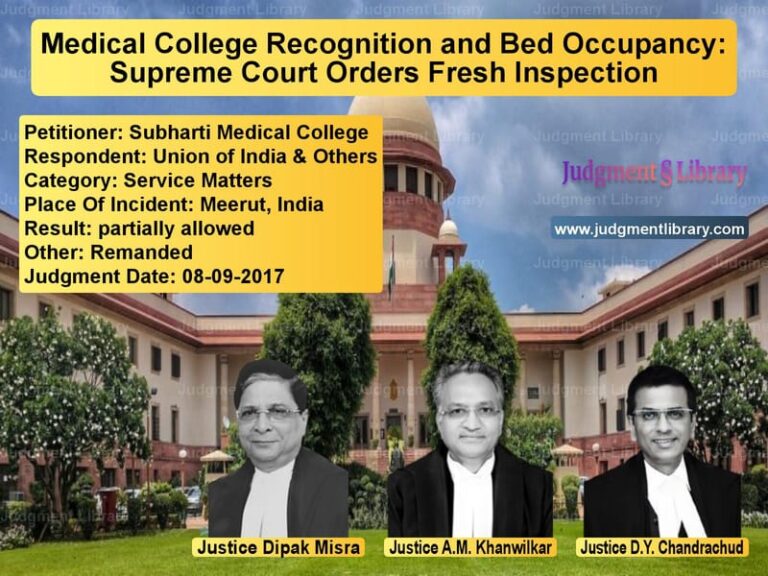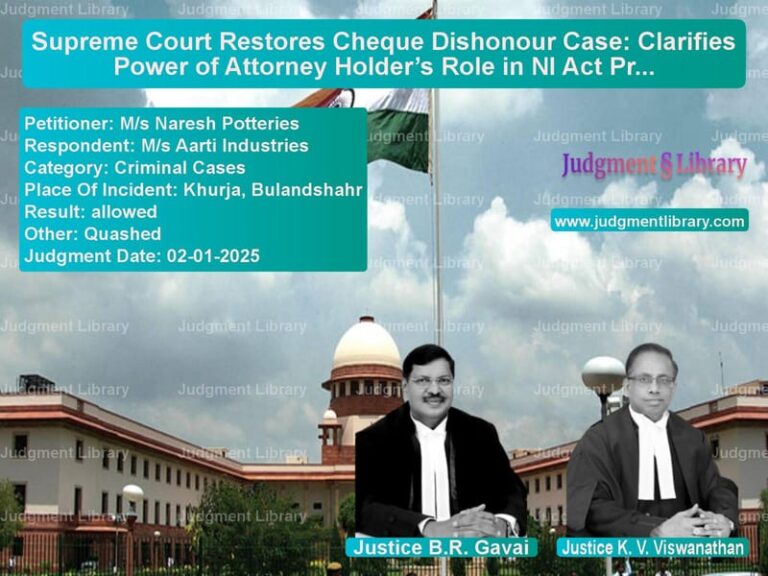Supreme Court Upholds Conviction in Punjab Bribery Case: Mukhtiar Singh vs. State of Punjab
The case of Mukhtiar Singh vs. State of Punjab is a landmark ruling by the Supreme Court of India concerning bribery and corruption in public service. The case revolves around the conviction of a Revenue Patwari, Mukhtiar Singh, who was caught red-handed accepting a bribe. This judgment reaffirmed the legal principles governing anti-corruption laws in India, particularly under the Prevention of Corruption Act, 1988. The Supreme Court, in its final verdict, upheld the conviction and dismissed the appeal, sending a strong message about zero tolerance for corruption in government offices.
Background of the Case
The prosecution alleged that Mukhtiar Singh, a Revenue Patwari in Patiala, Punjab, demanded a bribe of ₹600 from complainant Arjan Singh in exchange for issuing a certified copy of the Jamabandi (land record) for 1992-93. Arjan Singh, unwilling to pay the bribe, filed a complaint with the Vigilance Bureau. A trap was laid, and Mukhtiar Singh was caught accepting the tainted currency notes.
The Vigilance Bureau conducted the sting operation using standard protocols, including treating the currency notes with phenolphthalein powder, which reacts with sodium carbonate when in contact with water. This ensured conclusive evidence that the accused had accepted the bribe.
Trial Court’s Findings
The Trial Court found Mukhtiar Singh guilty under Section 7 (public servant taking gratification) and Section 13(2) (criminal misconduct by a public servant) of the Prevention of Corruption Act, 1988. The court sentenced him to:
- One year of rigorous imprisonment under Section 7.
- One year of rigorous imprisonment under Section 13(2).
- A fine of ₹1,000 for each offense, with an additional one-month imprisonment in case of default.
Both sentences were ordered to run concurrently.
Appeal Before the High Court
Mukhtiar Singh appealed the decision before the Punjab and Haryana High Court, arguing:
- That the complainant had a personal enmity with him.
- That the trap was fabricated and politically motivated.
- That procedural irregularities in the recovery process made the prosecution’s case unreliable.
The High Court dismissed the appeal, holding that:
- The Vigilance Bureau had followed due process in laying the trap.
- The complainant had no reason to falsely implicate the accused.
- The phenolphthalein test and recovery of bribe money confirmed the guilt of the accused.
Supreme Court’s Observations
The matter was taken up by the Supreme Court, where Mukhtiar Singh challenged the High Court’s ruling on similar grounds. The Supreme Court made the following key observations:
- “The demand and acceptance of bribe money are both essential ingredients for an offense under Section 7 of the Prevention of Corruption Act.”
- “Once it is established that a public servant has accepted a bribe, the burden shifts on the accused to prove that the money was not illegal gratification.”
- “Minor inconsistencies in procedural aspects of recovery do not vitiate the prosecution’s case.”
The Court emphasized that in corruption cases, even a slight presumption of innocence cannot override the overwhelming evidence against the accused.
Key Extracts from the Judgment
The Supreme Court ruled:
“The burden shifts to the accused once the prosecution establishes demand and acceptance of illegal gratification. Mere denial is not sufficient.”
Additionally, the Court noted:
“The evidence presented by the prosecution establishes the guilt of the accused beyond reasonable doubt. There is no reason to interfere with the concurrent findings of the lower courts.”
Final Judgment
The Supreme Court upheld the conviction and passed the following orders:
- Dismissal of the appeal filed by Mukhtiar Singh.
- Confirmation of the sentence of one year rigorous imprisonment for each offense.
- Endorsement of the penalty imposed by the lower courts.
Impact of the Judgment
The judgment has significant legal implications:
- It reaffirms the importance of anti-corruption laws and the credibility of trap operations.
- It ensures that public servants cannot escape liability for bribery on technical grounds.
- It strengthens public confidence in the judiciary’s commitment to eliminating corruption.
Landmark Precedents Referred
The Supreme Court relied on various past judgments, including:
- State of Maharashtra vs. Dnyaneshwar Laxman Rao Wankhede: Defined the burden of proof in corruption cases.
- State of Punjab vs. Madan Mohan Lal Verma: Established that recovery of bribe money corroborated with the phenolphthalein test is conclusive evidence.
- B. Jayaraj vs. State of Andhra Pradesh: Stated that mere possession of tainted money is not enough; demand and acceptance must be proved.
Public Reaction and Government Response
The verdict was welcomed by anti-corruption agencies and civil society organizations. The Punjab government also reaffirmed its commitment to strict enforcement of anti-corruption laws.
Conclusion
The Supreme Court’s ruling in Mukhtiar Singh vs. State of Punjab is a milestone in India’s fight against corruption. It underscores the need for transparency in government offices and reaffirms that public servants must be held accountable for their actions. By upholding the conviction and dismissing the appeal, the Court sent a strong message that corruption in public service will not be tolerated.
Don’t miss out on the full details! Download the complete judgment in PDF format below and gain valuable insights instantly!
Download Judgment: Mukhtiar Singh vs State of Punjab Supreme Court of India Judgment Dated 05-07-2016-1741873098222.pdf
Direct Downlaod Judgment: Direct downlaod this Judgment
See all petitions in Fraud and Forgery
See all petitions in Judgment by J. Chelameswar
See all petitions in Judgment by R K Agrawal
See all petitions in dismissed
See all petitions in supreme court of India judgments July 2016
See all petitions in 2016 judgments
See all posts in Criminal Cases Category
See all allowed petitions in Criminal Cases Category
See all Dismissed petitions in Criminal Cases Category
See all partially allowed petitions in Criminal Cases Category







